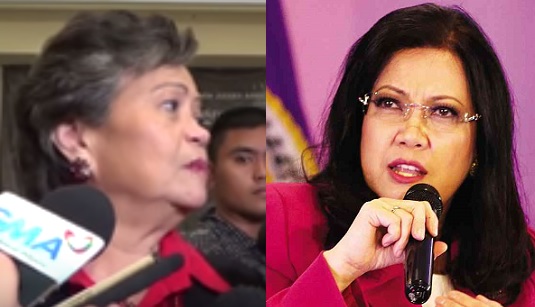Update
Chief Justice Maria Lourdes Sereno and Associate Justice Teresita Leonardo-De Castro engaged in a verbal head-butting during the Tuesday’s oral argument on the quo warranto petition.
The high court required Sereno to appear at the oral argument and answer questions from her fellow justices.
After taking her oath, De Castro was the first in line to ask the Chief Justice.
“Did you religiously file your SALN (statement of assets, liabilities and networth)?” De Castro asked Sereno.
Before answering De Castro’s question, Sereno said: “Can I have your assurance that when a quo warranto is filed against you, you would also under oath answer all questions on SALN.”
De Castro quipped: “Will you please answer the question” to which Sereno said “this is important, this is due process.”
Acting Chief Justice Antonio Carpio mediated and told Sereno to answer the question.
De Castro said under the law all government officials and employees are supposed to file a SALN upon assumption to duty and that SALN must be as of the date of assumption to duty.
Sereno said she agreed, adding that “I just want to make sure that the law…”
“No, no, no, it’s just…,” De Castro said to which acting Chief Justice Antonio Carpio said, addressing her, “it’s actually the Constitution. Can you show the constitution?”
De Castro said she would like to start the questioning with a constitutional provision on SALN.
Sereno said there are exemptions stated under the Anti-Graft Law and the Code of Conduct and Ethical Standards for Public Officials and Employees.
“I want to introduce the exemptions Justice De Castro not only here but in another regulation that I am asking the team to produce for me,” Sereno said.
“OK, if you want to do that. Are you done,” De Castro asked adding that the exemption Sereno has mentioned was subject to interpretation.
“May I request to present my slides so that the entire nation will have an understanding of the SALN,” Sereno said.
“Excuse me, I am still asking you questions,” De Castro said.
De Castro questioned Sereno why she failed to submit her 2006 SALN when she was supposed to submit two.
But Sereno maintained that she has complied with her SALN requirements.
“Where are these two SALNs…You cannot produce them before the court now?” De Castro asked.
Sereno said in the Doblada case, the high court did not require the court employee to produce the SALN.
In the 2008 Doblada case (Concerned Taxpayer vs. Doblada), while Doblada was convicted for violating the law for his unexplained wealth based on his 1974, 1976 and 1989 SALN, the high court said that they could not find sufficient evidence to prove that Doblada failed to file his SAL for the years 1975, 1977 to 1988, 1990, 1992, 1994, 1997, 1999 and 2000. Doblada submitted a letter from the clerk of court.
The high court, in the Doblada case, said “one cannot readily conclude that respondent failed to file his sworn SAL for the years 1975, 1977 to 1988, 1990, 1992, 1994, 1997, 1999 and 2000 simply because these documents are missing in the files of the OCA. Even in the report of the Court Administrator dated February 3, 2005, there was no categorical statement that respondent failed to file his SAL for the years earlier mentioned. The report of the OCA simply stated that it does not have on its file the subject SAL of respondent.”
